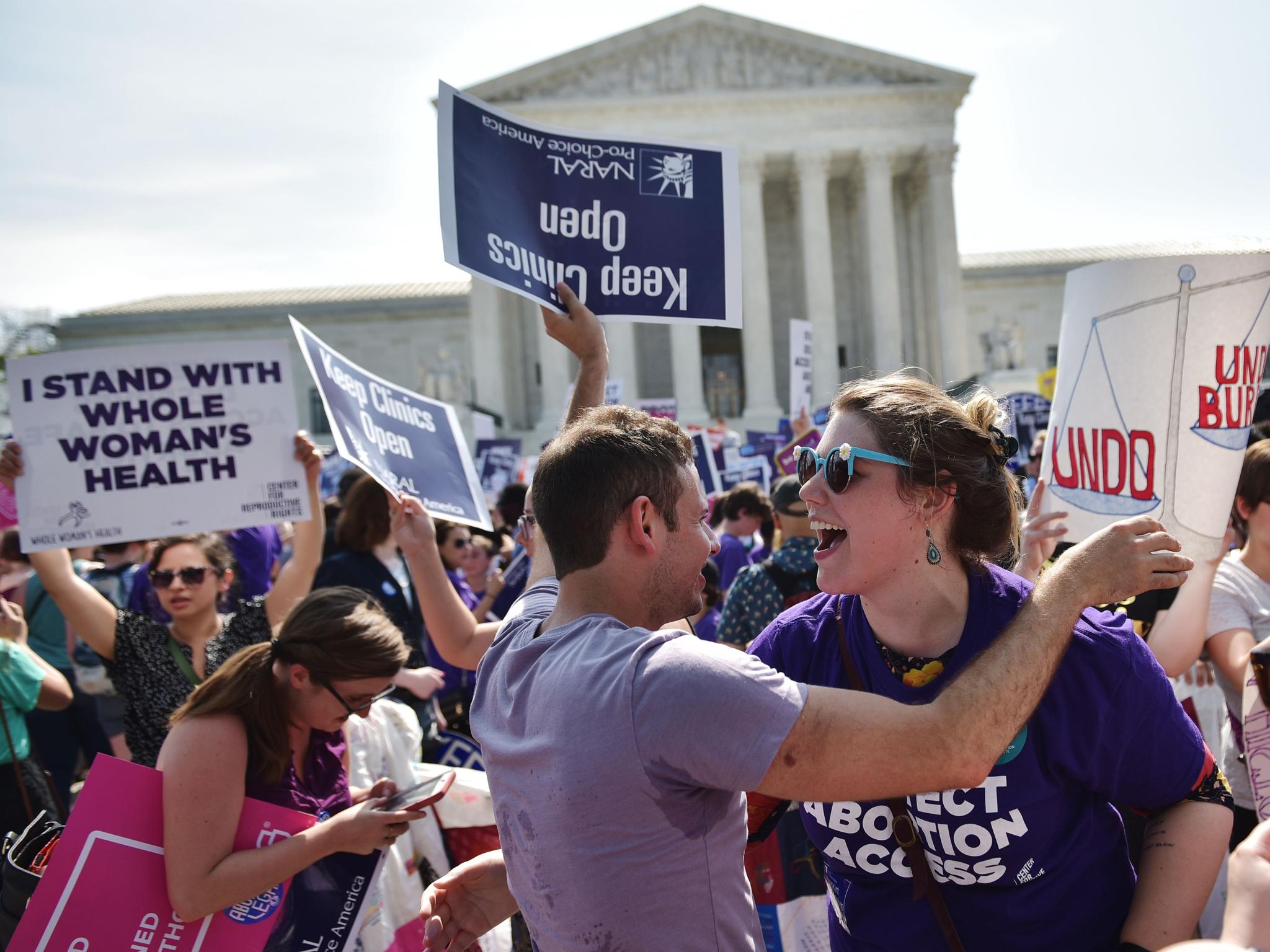What is HB2 and why did the Supreme Court overturn it?
The decision will broaden abortion access in Texas and sets precedent for similar laws in other states

Your support helps us to tell the story
From reproductive rights to climate change to Big Tech, The Independent is on the ground when the story is developing. Whether it's investigating the financials of Elon Musk's pro-Trump PAC or producing our latest documentary, 'The A Word', which shines a light on the American women fighting for reproductive rights, we know how important it is to parse out the facts from the messaging.
At such a critical moment in US history, we need reporters on the ground. Your donation allows us to keep sending journalists to speak to both sides of the story.
The Independent is trusted by Americans across the entire political spectrum. And unlike many other quality news outlets, we choose not to lock Americans out of our reporting and analysis with paywalls. We believe quality journalism should be available to everyone, paid for by those who can afford it.
Your support makes all the difference.Reproductive rights advocates are celebrating a monumental victory following the Supreme Court’s monumental decision to overturn a Texas law that heavily restricted women’s access to abortion in the state.
While the focus was on the Lone Star state in Whole Woman’s Health v Hellerstedt, the case could have set a major precedent for reproductive rights throughout the country, effectively rolling back progress made since 1973, when the court decided Roe v Wade.
But in the Court’s 5–3 ruling in favour of Whole Woman’s Health on Monday morning, the prohibitive Texas law was deemed unconstitutional.
What is House Bill 2 (HB2)?
Signed into law in July 2013, HB2 set forth provisions that would result in the closure of the majority of abortion clinics in the state of Texas. Under the law:
- Abortions doctors were required to have admitting privileges to a hospital within 30 miles of their clinic.
- All abortions clinics were required to upgrade to become ambulatory surgical centres (ASCs).
- Abortions after 20-weeks were prohibited, except in the case of “severe fetal abnormalities” or to “avert the death or substantial and irreversible physical impairment … of the pregnant woman”.
- Women who take abortion-inducing pills, must do so under the supervision of a physician, requiring two trips to the clinic for each dosage.
- After the administration of the abortion-inducing pills, a woman must set a follow-up visit with the physician 14-days after the dosage.
In addition to the three visits required of those seeking abortions under HB2, Texas passed a law in 2011 requiring women to undergo an ultrasound procedure 24 hours prior to getting an abortion - resulting in a minimum of four visits to the clinic.
Were the Supreme Court to uphold HB2, 10 or fewer clinics would have had to serve the women throughout the largest state in the continental US.
What is Whole Woman’s Health v Hellerstedt?
The Center for Reproductive Health filed a lawsuit in 2014 challenging two of the provisions of HB2 that they said presented an undue burden on Texas women. The lawsuit focused on two specific clinics - Whole Woman’s Health in McAllen and Reproductive Services in El Paso (both cities are on the Mexico border) - that would be harshly impacted by admitting privileges requirements.
The suit also focused on the requirement that abortion clinics upgrade to ASCs - which could have forced the shuttering of many clinics due to prohibitive costs.
Plaintiffs argue that HB2 is unconstitutional, citing the 1993 Supreme Court case Planned Parenthood v Casey when the court ruled that states cannot place “undue burden” on women seeking abortions. The decision also banned “unnecessary health regulations that have the purpose or effect of presenting a substantial obstacle to a woman seeking an abortion.”
How does the Supreme Court’s decision impact the rest of the US?
In the 5–3 ruling, Supreme Court justices determined that HB2 was unconstitutional.
“We conclude that neither of these provisions offers medical benefits sufficient to justify the burdens upon access that each imposes,” Justice Stephen Breyer wrote in the majority opinion. “Each places a substantial obstacle in the path of women seeking a previability abortion, each constitutes an undue burden on abortion access, ... and each violates the Federal Constitution.”
In her concurrence, Justice Ruth Bader Ginsburg dismissed the notion that Texas lawmakers were interested in protecting the health of women.
“[I]t is beyond rational belief that HB2 could genuinely protect the health of women,” she wrote, “and certain that the law ‘would simply make it more difficult for them to obtain abortions.’”
To that end, the ACLU says that the Monday morning ruling sets precedent for similar laws under judicial review in Alabama, Louisiana, Mississippi, Tennessee, and Wisconsin.
Join our commenting forum
Join thought-provoking conversations, follow other Independent readers and see their replies
Comments